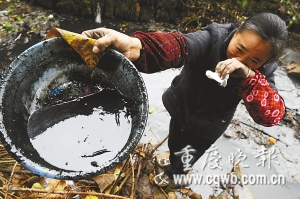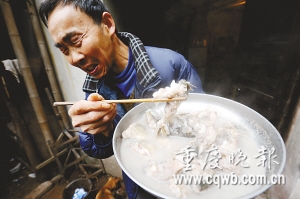35 tons of fish found polluted
"I've spent 600,000 yuan (US$87,879.90) in raising these fish and now that it's fish season, tests have shown they are polluted! What should I do? Sell them or eat them?" complained 44-year-old Long Dingxiang to the Chongqing Evening News, as he helplessly huddled by his fishing reservoir.
 |
 |
| Water from the upper breach of the Longtanzi reservoir is as black as Chinese ink. | The polluted fish emit a strong, kerosene-like smell. |
"Others are busy selling their fish. But my fish, even though they look big and vigorous, can only stay in the reservoir and await feeding time," said Long.
An experienced fish breeder, Long signed a contract with the Beibei District of Chongqing Municipality in July 2008, giving him the right to operate the Longtanzi reservoir. He employed specialists to take care of his 35 tons of fish and had good visions of this year's harvest.
So it's no surprise that this hard-working man was almost overwhelmed when some of his fish started dying. Tests showed that his fish, smelling like kerosene, were inedible. Even Long himself did not dare eat the cooked fish.
"The fish were polluted by phenol and oil," said Wu Qing, a professor from Southwestern University. The Chongqing Evening News found that a small factory could have been discharging a dark yellow industrial chemical into a river that eventually flows into the Longtanzi reservoir.
According to Wu, fish are vulnerable to industrial wastewater and can hardly excrete toxic wastes. If the reserved toxic wastes are under a certain amount, the fish show no obvious abnormalities, but are still rather harmful to human beings.
Shi Lianming, a lawyer in Chongqing, suggests Long appeal to the said factory for compensation. The local environment authority may also bear responsibility for the lack of supervision of pollutant discharge.
 0 Comments
0 Comments






